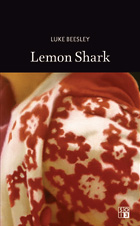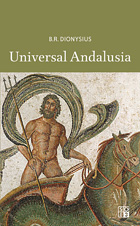 Lemon Shark by Luke Beesley
Lemon Shark by Luke Beesley
papertiger media, 2006
Universal Andalusia by B. R. Dionysius
papertiger media, 2006
'The shape of sunlight cutting up your arm'. This was the line that first drew me to Luke Beesley's work. Around the same time I read a biographical note that mentioned how Beesley had written many of the poems in a light-filled studio in the middle of Brisbane. There was the suggestion that light had entered the poems in some way, and I liked the idea that poetry could do that. Light is the first word I think of when I try to think of words to describe Beesley's latest collection, Lemon Shark, along with other 'L' words: leisurely, languorous, leaning.
There is something in-between about the 'L' sound, not quite a consonant or a vowel: according to my 1948 dictionary, it's known as a semi-vowel, a 'liquid vowel' (which suits Lemon Shark perfectly), or a sonorous consonant. Lemon Shark's poems explore language at this liquid level, where sounds stream into forms. And then there is the title of the collection – harmless and threatening, cute and strange. It is a book concerned with light (and lightness), but these are elements that might cut or bite. Paradoxes and oppositions like this crop up throughout the book: lightness and heaviness, languor and suddenness, and most often, light and shadow.
Throughout this collection there are references to films, coffee, friends and lovers, music, light and the experience of looking at light, and all the ways we experience books and reading. Movies are cited throughout the poems, often explicitly referenced as a subtitle; 'Temperature and Actresses', for example, is introduced as written after Tran Ahn Hung's film The Vertical Ray of the Sun. It's an appropriate film to choose as there is something sweaty about this whole book, evoking humid and still Brisbane afternoons. There are particular books that the poems draw upon too – such as Gabriel Garcia Marquez's novel One Hundred Years of Solitude – but Lemon Shark thinks about books not only as literature but as concrete objects made of covers, titles, spines and sentences. In 'After the Ash Tree', for example:
-the scent
of the new book, the hard bound book, that I pick up again
like a hint of shave cream on mornings, slipstreams of a father
now my lover who delights in the scent of me after the blade-
In these poems, reading isn't separated from thinking and looking. Watching a DVD at home figures as a kind of interruption in a larger field of sensation and experience. At times, it is as if these technologies of print and cinema come to be instilled in the language itself, in the choice of a word, or the way a line drops and falls across the page.
Many of these poems are studies of momentariness. They are poems in which the moment is exploded, and its aftershock is registered on the page. Time leans, to use a verb used all through the book, into or across experience. The poems make their own time. You can feel in many of these poems how intently (and explicitly, with the two poems that use letters for titles) Beesley is trying to bring language closer to experience.
The poems make use of a variety of forms. Some move all over the page ('Happy Together, 16 Poems'); some are laid out in roughly equal lines; while some are like surrealist language games which take a sound, a letter or a word and see where it takes them ('My Compliment is not a Tulip', 'B'). Most of the longer poems in the second section (such as 'Milk Teeth' and 'Orange') make use of the sentence and paragraph as structuring devices. These are where the poems are most formally inventive, but also where they can lag a bit. At times they are too open to experience and the play of language that they become overexposed. Other poems come across as overly aestheticised, missing the moment they were after.
What I find most intriguing about this book is the sense I get of a magical Brisbane – nothing to do with the Courier Mail, Peter Beattie, the Gold Coast and whatever else people not from there think of when they think of Brisbane – and instead all about films, books, coffee and lovers. These poems are letters from that place. What is lasting about these poems is their faith in the redemptive power of art, in the pleasures of work, and the connections they make between the processes of thinking, looking, reading, and writing.
 The generality of the poems in Lemon Shark, and their reluctance to name (other than in the subtitles), is one of the ways they differ from the poems in Universal Andalusia, the new collection by Beesley's fellow Brisbanite B. R. Dionysius. Where Beesley's poems are mostly free of proper nouns, Dionysius' poems are constructed out of them, referencing everything from Greek mythology to Gen-X period pop culture (Ok, mostly Greek mythology and Gen-X period pop-culture). A few of the references taken from the first section of the book give some idea of the breadth of Dionysius' citations: Boney M's 'By the Rivers of Babylon,' Dickheads matches, Jean Michel Jarr?©, The Big Banana, A. B. 'Banjo' Paterson, A Brief History of Time, Chewbacca, Sydney Opera House and Close Encounters of the Third Kind. This list of the references looks like an archaeological record of the contemporary world from the perspective of an Australian Gen X-er.
The generality of the poems in Lemon Shark, and their reluctance to name (other than in the subtitles), is one of the ways they differ from the poems in Universal Andalusia, the new collection by Beesley's fellow Brisbanite B. R. Dionysius. Where Beesley's poems are mostly free of proper nouns, Dionysius' poems are constructed out of them, referencing everything from Greek mythology to Gen-X period pop culture (Ok, mostly Greek mythology and Gen-X period pop-culture). A few of the references taken from the first section of the book give some idea of the breadth of Dionysius' citations: Boney M's 'By the Rivers of Babylon,' Dickheads matches, Jean Michel Jarr?©, The Big Banana, A. B. 'Banjo' Paterson, A Brief History of Time, Chewbacca, Sydney Opera House and Close Encounters of the Third Kind. This list of the references looks like an archaeological record of the contemporary world from the perspective of an Australian Gen X-er.
Universal Andalusia is part verse novel, part travelogue, narrated by 'our hero', Baldwin, 'An overweight (big boned his mother always reassured)/Anglo-Celtic, thirty-something, first-world Gen-Xer' (from 'Who the Fuck is Baldwin?'). Through the course of the book, Baldwin and his wife Roxanne, a poet, trace the route of Baldwin's hero Alexander the Great through Asia Minor, whilst taking a small diversion in Greece to pay homage to the late Australian poet Martin Johnston. The second half of the book sees them travelling through Spain and India.
Baldwin – described in Peter Minter's endorsement as 'the mutant chimera of Alexander the Great and Bazza McKenzie' – disgraces himself in every tourist trap he finds himself in, whether by pissing on the Parthenon or getting into fights with an American tourist. This ockerism can seem like a an anachronism at times, a throwback to the 'Life's a Beer' world of rhyming slang, Fosters, smoking on the beach and drink driving. Yet after the Cronulla riots, and the response of a PM who elides the line between patriotism, racism and violence as effectively as he does the line between word and deed, you may wonder if this stereotype needs a new Bazza Mackenzie to parody it all over again.
Baldwin and, even more so, his wife Roxanne, have all the positive traits of this mythical Australian stereotype – a love of egalitarianism and a nose for bullshit. In Turkey, Baldwin and Roxanne happily take the piss out of the Gallipoli industry when they find Peter Weir's eponymous film of the event is on 24hr video loop (''Ah no-not GALLIPOLI. That film's a piece of crap'' from 'Song of the Australians in Action'). Dionysius definitely seems to be on the side of the loveable rogue Baldwin – bumbling and hot-tempered but with his heart in approximately the right place – and along with Roxanne they are with the Greek gods who tried and failed tragically. They are, most of all, for living passionately.
There is something in Dionysius's poems of the travelling spirit of poets like Stephen Herrick and Peter Bakowski, but without their spare style. His is much more about compression, packing in as much detail as possible, and then going for it. Their dense syntax reminds me of old rental vans, gunning along, picking things up and dropping them off, doing everything as quickly as possible. Many of the best, wackiest lines throughout the book reward close reading, such as these from 'You Talkin' to Me?':
Fake Levis excavate
holes in the sediment of Bronzed Athenians
while across the intersection, Jeff Koons exhibits 50
photo albums shaved in half & sunk in formaldehyde-
laced fish tanks
One of the consequences of melding poetry and the novel is that sometimes the lines can come off sounding cumbersome, as they occasionally do. Dionysius' poems are also highly performative and ask to be read aloud.
'The Descent of Man' begins with Baldwin asking Roxanne 'How many people died in wars in the 20th century?' Reading the answer to this question – a list of many of the major wars – is an amazing experience; and seeing these conflicts named one after the other, with their existence asserted in this way, makes the reader think that something, no matter how small, is being done to understand them. This view might highlight something about Dionysius's poetics more broadly. Names are important to him, and he understands that that which isn't named is more powerful than that which is. Historical figures and myths come up again and again in Universal Andalusia, and simply by naming them (and it's important that Dionysius uses the endonyms for places where he can) he is able to bring them down to a level where they can be thought about, talked about, laughed at, and perhaps understood.
The editors of papertiger media's Soi 3 modern poets series deserve credit for publishing these two very different books, as do the designers for making them into elegant objects.













